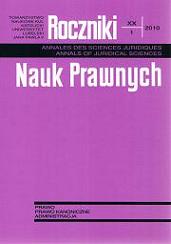Kompetencje legislacyjne biskupa diecezjalnego w zakresie munus sanctificandi
Legislative Competence of the Diocesan Bishop in Munus Sanctificandi
Author(s): Jerzy AdamczykSubject(s): Law, Constitution, Jurisprudence
Published by: Towarzystwo Naukowe KUL & Katolicki Uniwersytet Lubelski Jana Pawła II
Keywords: diocesan bishop; munus sanctificandi; legislation; liturgy; Sacraments; extrasacramental acts of God's cult; biskup diecezjalny; munus sanctificandi; ustawodawstwo; liturgia; sakramenty; pozasakramentalne akty kultu Bożego
Summary/Abstract: The article attempts to present the issue of legal possibilities concerning munus sanctificandi, granted to diocesan bishops by the Code of Canon Law of 1983. Sanctification is one of the main tasks diocesan bishops are faced with. The Code, then, declares that “the bishops in the first place exercise the sanctifying function; they are the high priests, the principal dispensers of the mysteries of God, and the directors, promoters, and guardians of the entire liturgical life in the Church entrusted to them” (Canon 835 § 1). The brief introduction to the first part is followed by a description of the areas of the sanctifying function of the Church – areas which the diocesan bishop is obliged to regulate. The considerations in this article focus on the following issues (to be canonically regulated by the diocesan): regulations in liturgy matters, appropriate celebration and admission to the Sacraments, liturgic functions of the laity, communicatio in sacris), Holy Sacraments, extrasacramental acts of God’s cult, as well as holy places and festivals. The above legislative competences can be realized both at a synod and elsewhere.
Journal: Roczniki Nauk Prawnych
- Issue Year: 20/2010
- Issue No: 1
- Page Range: 187-208
- Page Count: 22
- Language: Polish

